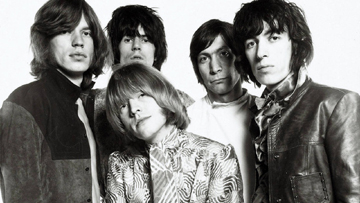Charlie Watts: A Legendary Drummer and His Jazzier Roots (From The Archives)

Photo by Philppe Marchin
Following the passing of Rolling Stones drummer Charlie Watts, we revisit this piece on his group ABC & D Of Boogie Woogie (the band name reflects the four member first names: Axel Zwingenberger (piano); Ben Waters (piano, vocals); Charlie Watts (drums); Dave Green (bass)) who released their Live In Paris album in 2012).
***
The man really is the Cary Grant of rock and roll. His elegance on and off the bandstand is matched by the inescapable power and finesse of one of the world’s great drummers. Charlie Watts has been providing the beat for The Rolling Stones for almost 50 years and, in an historical view, is unchallenged by anyone else for everything the band has accomplished.
But there’s another story to the elegant Englishman: His love of jazz and improvisation doesn’t know any bounds. It’s where Charlie Watts’ musical story begins. As a boy he listened to Chico Hamilton provide the beat for Gerry Mulligan’s recordings and Davey Tough drumming with Bunny Berigan and Benny Goodman. That’s where Watts first found the spark and it’s one he never lost.
Today, the drummer is the “C” in the ABC&D of Boogie Woogie. The quartet, which features pianists Axel Zwingenberger and Ben Waters along with bassist Dave Green, attacks the time-honored wildness of boogie woogie with all barrels blazing. (When it came time to form the band, one of Watts’ deciding factors to join was the inclusion of Green. The two grew up next door to each other in London and, during the years, have played together in various jazz groups, including a big band that Watts led.) There is a ferocious zeal at the center of their sound and, while no one runs the risk of running off the rails, it’s a style that demands exuberance as a starting point. Watts’ drums remain the epitome of that excitement.
The group’s debut album, Live In Paris, was recorded live at Duc Des Lombards in The City of Light during a five-night stand in 2010, and features songs by Big Joe Turner, Pete Johnson, W.C. Handy, Dr. John and Cousin Joe Pleasant, among others, along with seven originals that swing right along with the classics. The music is a primer of boogie woogie for the 21st century and, while much of the initial attraction is to hear a Rolling Stone in action, in the end, it’s an overwhelming homage to the music – music that may be a hundred years old but, in these hands, sounds like four slightly-demented enthusiasts having the time of their life.
For Watts, drumming is drumming and it’s a matter of degrees that might separate songs like the Stones’ “Jumping Jack Flash” and Big Joe Turner’s “Roll ‘Em Pete.” The sheer talent it takes to turn the playing into a life force is what gives all the greats their unique ability.
“I play the same way, really, no matter who I’m with,” the 71 year old says. “It’s really all in the touch that changes when you go from rock and roll to blues or jazz or whatever else you might be doing. It’s in the feel. My thing is to make it a dance sound. It should swing and bounce. I learned to play by copying other people. It’s one of the faults in my playing. I should have gone to class and learned how to do it. I never did. I learned by watching the great drummers in London, like Phil Seamen. When I was 17, I went to Paris to see Kenny Clarke playing with Bud Powell. Clarke had the greatest cymbal I’ve ever heard. It was an 18-inch ride and it was really in how he played it that made it sound so incredible.”
Like the sky-blue pearl set of Ludwig drums he first used in The Rolling Stones, Watts approaches life like it’s an endless experiment in style and grace. For him, each recording session was about meticulous attention to detail, much the same as his love of everything from traditional English fashion to the fascination for Jimmy Reed’s drummer Earl Phillips and his ability to play the absolute essence of what Reed’s songs called for.
It’s not that far from Savile Road to “Bright Lights, Big City,” and that likely holds a clue as to why Watts remains without equal as a member of The Rolling Stones. He has never been one to seek the spotlight, instead finding his strength in being in charge of the beat. “I was always brought up under the theory that a drummer is an accompanist,” he says. “I don’t like drum solos; I never take them. One of the hardest things is to play intensively but very quietly. But it’s one of the things you have to do if you want to play the music called jazz.”

From Watts’ early jazz roots, it wasn’t a far leap into The Rolling Stones. He had been a graphic designer at an advertising agency in London, moonlighting now and then with Alexis Korner’s R&B band. When he got the offer to join the Stones, supposedly the band had been saving their food money to be able to afford their drummer of choice. For Watts, he quickly received an intense education in the blues that Brian Jones loved so much, mainly Jimmy Reed and Elmore James. He also got a birds-eye view of the soon-to-be burgeoning British Invasion.
“When we started, it was all about how the two guitars played together and where the rhythm section fit in,” Watts says. “When you’re playing rock and roll, the challenge is strength. As Keith used to say, ‘we play by feel.’ But feel is numbers too and you have to count, which is what practicing helps. When you’re a drummer, though, you need other people to play. You can’t really just play on your own. Once we started working, we played as much as we could. I remember getting my set of Ludwig drums, which was the only American brand you could buy then. Ringo (Starr) had the black oyster pearl set, and I didn’t want the same, so I got the sky-blue pearl kit. I’ve still got them, too.”
When he’s drumming flat-out boogie woogie on a club stage not much bigger than a closet, it’s the same hands and feet that have played in the world’s biggest stadiums for nearly 50 years as the back line for the Stones. In so many ways, it’s almost an Olympic feat, but maybe the real gift that Watts has given us all these years is the easygoing manner by which he’s maintained his cool.
There is never a question that whatever he does, it will be done straight from the soul. Listen to the way the man takes his time before beginning the beat on a ballad like “Wild Horses.” He waits for the second verse, always taking his time, and then comes in on the snare drum like the world is waiting. No flash, no foolishness – just a feeling that right now that is the only beat that really matters.
One of the highest compliments about his abilities came from no less a source than Ahmet Ertegun. As someone who was a first-hand witness to jazz’s rise to prominence in America, as well as a man who helped give birth to rock and roll as head of Atlantic Records, Ertegun said that the reason The Rolling Stones were the best rock band in the land was the fact that Watts knew how to swing.
For his notoriety as the only drummer The Rolling Stones have ever had, jazz will always be his original inspiration. “I don’t try and separate music – not really,” he says. “I just try to play the best I can. When we started, we liked to play a Bo Diddley beat, and I loved that. But I also love Tony Williams with Miles Davis, and Earl Palmer with Fats Domino. It’s all music. Listening to how other people approach it is fascinating. I know I can never become as good as the people I’ve watched. It’s terribly frustrating. There’s so much to learn. You think you’ve cracked it and then you go to some little club in New Orleans and there’s some guy that nobody’s ever heard of but five of his mates who play in the band and you just think that’s it [because he’s so good]. Or you go and see a master like Roy Haynes, and when you see him you go, ‘I’ll never ever get there.’”
Considering where the young man started, Watts has gone far. Keith Richards once said that The Rolling Stones would continue as long as Watts wants to play, but when that’s done, the band will call it a day. No doubt that might be hyperbole, but it still rings with plenty of truth.



















